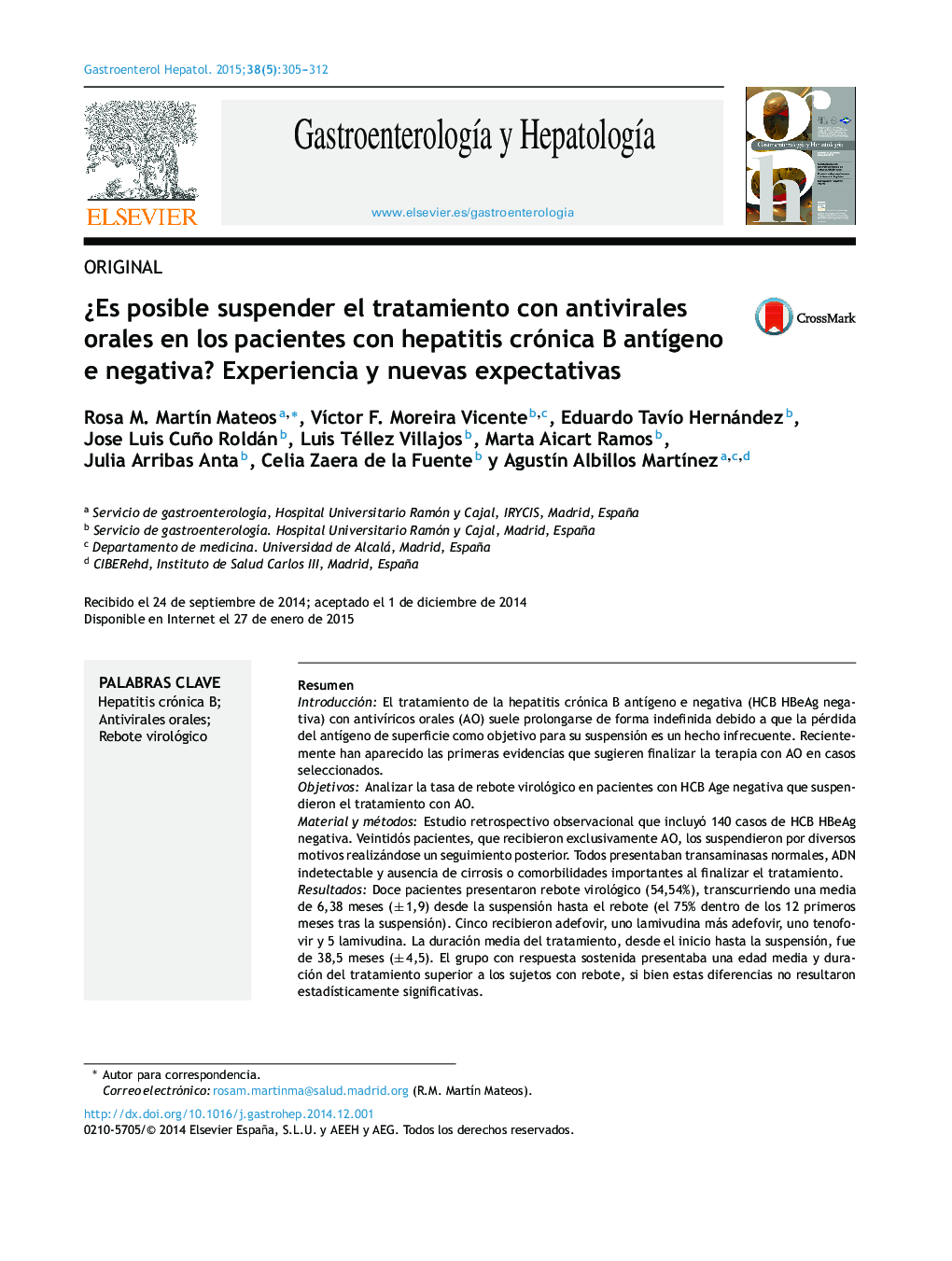| کد مقاله | کد نشریه | سال انتشار | مقاله انگلیسی | نسخه تمام متن |
|---|---|---|---|---|
| 3287909 | 1209471 | 2015 | 8 صفحه PDF | دانلود رایگان |

ResumenIntroducciónEl tratamiento de la hepatitis crónica B antígeno e negativa (HCB HBeAg negativa) con antivíricos orales (AO) suele prolongarse de forma indefinida debido a que la pérdida del antígeno de superficie como objetivo para su suspensión es un hecho infrecuente. Recientemente han aparecido las primeras evidencias que sugieren finalizar la terapia con AO en casos seleccionados.ObjetivosAnalizar la tasa de rebote virológico en pacientes con HCB Age negativa que suspendieron el tratamiento con AO.Material y métodosEstudio retrospectivo observacional que incluyó 140 casos de HCB HBeAg negativa. Veintidós pacientes, que recibieron exclusivamente AO, los suspendieron por diversos motivos realizándose un seguimiento posterior. Todos presentaban transaminasas normales, ADN indetectable y ausencia de cirrosis o comorbilidades importantes al finalizar el tratamiento.ResultadosDoce pacientes presentaron rebote virológico (54,54%), transcurriendo una media de 6,38 meses (± 1,9) desde la suspensión hasta el rebote (el 75% dentro de los 12 primeros meses tras la suspensión). Cinco recibieron adefovir, uno lamivudina más adefovir, uno tenofovir y 5 lamivudina. La duración media del tratamiento, desde el inicio hasta la suspensión, fue de 38,5 meses (± 4,5). El grupo con respuesta sostenida presentaba una edad media y duración del tratamiento superior a los sujetos con rebote, si bien estas diferencias no resultaron estadísticamente significativas.ConclusionesLos resultados sugieren que es posible suspender la terapia con AO en casos seleccionados de HCB Age negativa, siempre que no exista cirrosis, se cumpla un tiempo mínimo de tratamiento, las transaminasas sean normales y el ADN indetectable de forma mantenida. En estos casos, se debe realizar un seguimiento estrecho durante el primer año y posteriormente de forma indefinida.
BackgroundTreatment of HBeAg-negative chronic hepatitis B (CHB) with nucleos(t)ide analogues (NA) is usually indefinite, since the loss of HBsAg, as a criterion for its discontinuation, is a rare event. Recent evidence suggests that discontinuing NA therapy may be feasible in selected patients.ObjectivesTo analyze the rate of virological relapse in patients with HBeAg-negative CHB who discontinued treatment with NAs.MethodsWe performed a single-center observational study that included 140 patients with HBsAg-negative CHB. Twenty-two patients, who received only NAs, discontinued treatment for different reasons and were subsequently monitored. All had normal ALT and AST, undetectable DNA and absence of cirrhosis or significant comorbidities before stopping treatment.ResultsTwelve patients showed virologic relapse (54.54%). The mean interval between discontinuation and relapse was 6.38 months (± 1.9) (75% relapsed during the first 12 months after discontinuation). Five received adefovir, 1 lamivudine and adefovir, 1 tenofovir and 5 lamivudine alone. The mean treatment duration in this group was 38.5 months (± 4.5). The sustained response group had a higher mean age and longer treatment duration than patients with virologic relapse but these differences were not statistically significant.ConclusionsThe results suggest that NA treatment can be stopped in selected patients with CHB as long as they are not cirrhotic, have completed a minimum period of treatment, have normal ALT and sustained undetectable DNA. These patients should be closely monitored during the first year and then indefinitely.
Journal: Gastroenterología y Hepatología - Volume 38, Issue 5, May 2015, Pages 305–312